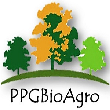Banca de QUALIFICAÇÃO: MATHEUS SERGIO LUBIAN
Uma banca de QUALIFICAÇÃO de MESTRADO foi cadastrada pelo programa.DISCENTE : MATHEUS SERGIO LUBIAN
DATA : 07/12/2020
HORA: 14:00
LOCAL: Ambiente Virtual
TÍTULO:
AGROBIODIVERSITY, PHENOLOGY AND GENETIC DIVERGENCE FROM TRADITIONAL VARIETIES OF Arachis hypogaea L. IN THE MUNICIPALITY OF ALTA FLORESTA - MT.
PALAVRAS-CHAVES:
genetic resources, variability, creole varieties, ethnovarieties, genetic improvement.
PÁGINAS: 90
GRANDE ÁREA: Outra
ÁREA: Ciências Ambientais
RESUMO:
Peanuts (Arachis hypogaea L.) belong to the Fabaceae family, the same as other crops known as beans, soybeans, lentils and peas. Its genus, Arachis, houses more than 80 species, some with economic importance, for human consumption, ornamentation or forage. This culture is very important for human food, very present in family farming, being one of the most cultivated oilseeds in the world. The objective of the study was to carry out a survey of the traditional varieties of A. hypogaea cultivated by farmers in the municipality of Alta Floresta, Mato Grosso, and to evaluate genetic diversity through phenological attributes and morpho-agronomic descriptors. Eight traditional peanut varieties collected from rural communities in the interior of the municipality were evaluated. The experiment was carried out in the same municipality, and evaluated the genetic diversity of the varieties through vegetative, fruit and seed descriptors, in addition to vegetative and reproductive phenology. The data obtained in the interviews with the interviewed producers, as well as the phenological attributes and qualitative morpho-agronomic descriptors were submitted to descriptive statistics. The data from the quantitative morphoagonomic descriptors were subjected to analysis of variance and comparison of means. Ten producers were interviewed, all male, aged between 50 and 84 years old, 20% of them retired. They have between 2 and 50 years of experience with the crop, and 80% of them stated that their seeds come from Mato Grosso. Its seeds are stored with pods, in nylon bags, burlap, water tanks and old refrigerators, or in PET bottles, without pods. The monoculture system predominates, only 10% carry out intercropping. All respondents cultivate for their own consumption, and 60% market grains and derivatives. All quantitative variables showed a significant difference at the level of 1% probability by the Tukey test. The cluster analysis by the Tocher method resulted in the formation of three groups, with group II covering 62.5% of the accessions, followed by group I with 25%, agreeing with the groupings formed from the dendogram generated by the UPGMA method, and the result of the graphic dispersion of varieties through canonical variables. The analysis of the canonical variables of the 14 quantitative characters showed that the first two variables explained 97.49% of the total variation. Plant height, mass of 100 grains, chlorophyll index and number of pods presented a greater relative contribution to genetic divergence. In the phenological evaluations it was verified that the accessions UNEMAT 024, 026 and 027 germinated first, 4 days after sowing. The appearance of flower buds in these varieties was also earlier, at 24 days. The accessions UNEMAT 021 and 022 showed the lowest phenological cycle, of 100 days, showing good adaptation to the environmental conditions of the region. In addition to helping producers to obtain better yields by choosing the most productive varieties, the present study also showed promising genetic materials that can be used in new breeding programs in the northern region of Mato Grosso.
MEMBROS DA BANCA:
Presidente - 253925001 - SERGIO ALESSANDRO MACHADO SOUZA
Interno - 32143004 - ANA APARECIDA BANDINI ROSSI
Externo ao Programa - 264492002 - KELLEN COUTINHO MARTINS



